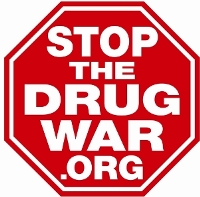About main | Cause | Mission | History | Staff | Board of Directors | Board of Advisors
StoptheDrugWar.org was founded by David Borden in 1993 as the Drug Reform Coordination Network (DRCNet), the pioneer organization for online activism in drug policy reform during the early days of the commercial internet. Since its inception the organization has staked out a clear and unambiguous stance in favor of ending drug prohibition outright.

In late 1998, the organization launched the Higher Education Act Reform (HEA) Campaign, opposing a law passed that year taking financial aid away from students because of drug convictions. Ten members of Congress participated in a press conference organized in 2002 by DRCNet under the umbrella of the Coalition for Higher Education Reform, a record still in place for a drug policy reform press conference. The coalition achieved a partial reform to the law in 2006, when it was limited to offenses committed while a student is in school and receiving federal aid -- one of only a few scale-backs to the federal drug war to date. A further reform that would have further limited the law's reach to sales convictions passed the House of Representatives, but the section of the education package that contained the language was removed when Democrats combined it with health care reform in 2010 as part of their strategy to pass both bills.

In late 2001 StoptheDrugWar.org launched "Out from the Shadows: Ending Drug Prohibition in the 21st Century," a global campaign and conference series. The lead event took place in Mérida, Mexico, drawing 300 attendees including legislators from seven countries. At the time Out from the Shadows Mérida featured the most extensive high level political participation ever seen at a drug policy reform conference.

In this time of scarcer funding, StoptheDrugWar.org has continued our primary focus on publishing and information, while also taking on areas of importance to drug policy reform in which we are in a position to make an impact through targeted efforts. Through our network of organizational contacts built in the HEA campaign, we play an important role in DC-based justice reform working groups, recruiting signatories for sign-on letters to Congress. In September 2012 we held our first in a series of member teleconferences, this one featuring representatives of the three legalization initiatives. We are currently in the process of developing a set of new content areas for our web site and social media that will focus new attention on the harms of drug prohibition and alternatives.